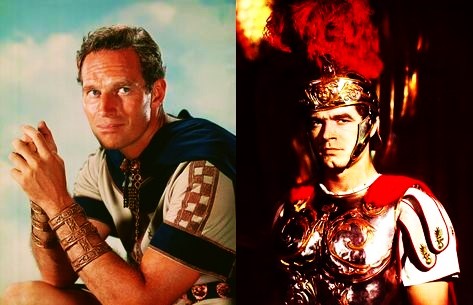Ben Hur (1959) is a defining epic. It is a film that was only possible back in late fifties and early sixties, where there sets the size of skyscrapers, scenes with tens of thousands of extras, and a chariot race that would and will be computer generated graphics in the new remake. Ben Hur more than being a incredible epic in scale, has the soul Judea in the time of Jesus. Aptly, Judah Ben Hur, the protagonist played by the champion actor Charlton Hesston captures the indomitable spirit of the Jewish People in the face of absolute oppression under Roman Rule. Judah Ben Hur's story touches ones heart because it is the story of a man in holy land who is stripped from his place in society and must suffer on the path to sour revenge and sweet salvation. On the way, Hur encounters the HaMashiach, Jesus Christ, who offers Him living water, "but whoever drinks the water I give them will never thirst. Indeed, the water I give them will become in them a spring of water welling up to eternal life." (John 4:14). While this water will later revive the redemption in Ben, revenge still boils in his blood towards Massala, the man who took everything he had and whom he once called friend, and even brother.
The fury of Hur against Masala reaches its apex and climax at perhaps the most memorable scene in motion picture history, the chariot race in Hipprodrome overseen by Pontius Pilate. Masala like any Roman cheats, using a Greek chariot with corckscrew like blades on the hubcaps. Despite the advantages of his enemy, Ben Hur is victorious, He wins the race and Masala wrecks maiming himself almost beyond recognition. Massala dying waits for his enemy, Ben Hur appears, and Masala says in shambles, "What do you think you see? The smashed body of a wretched animal? There's enough of a man still left here for you to hate. Let me help you." In that moment you feel how fleeting our enmity towards are enemies is, how an "eye for an eye" does not satisfy, for when we behold the person in pieces, we are reminded, they are not some monsterious and faceless foe, but a man and once a friend. In that moment we behold on the big screen the words of our Savior, "You have heard it said, love you neighbor and hate yoru enemy. But I say, love your enemy, and pray for those who persecute you." (Matthew 5:43-44).
Ben Hur discovers as all do on path of vegence, that there is no end to blood letting. Not satisfied with Masala slain, he seeks to join the Zealots in resisting Rome; a path that inevitably will end with his death. But in middle of Ben Hur big ideas, Jesus Christ steps in, and witnessing His crucifixon, Ben Hur finds himself changed, in his own words, "Almost at the moment He died, I heard Him say, "Father, forgive them, for they know not what they do." Even then. And I felt His voice take the sword out of my hand." That is power of the Prince of Peace, to slay with His searching eyes are hate and contempt for one another. Only in Christ Jesus is there the love and peace of spirit that can put to rest all the rage, and reckless abandon. In Him there is the Redemption of our souls. Ben Hur witnesses a miracle, those he loves touched by the mercy of the Messiah's blood, and we know for certain his course is changed, as we behold the crosses in sunlight at calvary and words of choir, "Hallejuah! Hallejuah!"
Ben Hur is a film that stirs the very soul, it quickens in us the yearning for home, the holy land, the desert of Judea, and reminds us on narrow path (Matthew 7:13) that Jesus Christ is the only rest for our weary hearts, broken bodies, and shattered dreams. In the Son of God is the only source of salvation, and serenity in times of severity and slavery. While Rome rules with an iron fist, The Redeemer rules the world with an iron rod, and offers reconilation to all who will, "If confess Jesus as Lord, and believe in your heart that God raised Him from the dead and you shall be saved." (Romans 10:9). This is your chance to discover an end to your enemity, emptiness, and evil ways; Emmanuel, Jesus Christ died for your sins and offers you salvation, for He rose from dead and shall raise you in spirit and then in body if you will believe in Him. You can waste your like as Massala did, turning on those who loved you for the ambitions of a great power like Rome, or you can seek Redemption for your soul and behold miracles that Ben Hur did. You decide who you shall serve, God or Money. (Luke 16:13).

Comments
Post a Comment